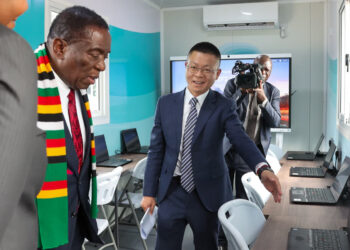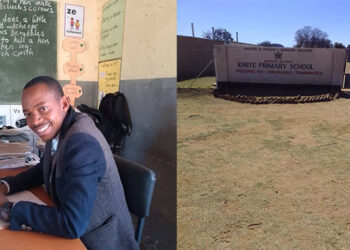VIABLE and sustainable information management systems need to be developed to counterbalance social media imperialism that can destabilise the country’s national security, the Minister of Information, Publicity and Broadcasting Services, Dr Jenfan Muswere, said yesterday.
Presenting a public lecture on the evolution of information systems in the context of media and national security at the Zimbabwe National Defence University in Harare, Dr Muswere underlined the need to redefine national security in the face of the evolving systems that were threatening peace and security in the country
Minister Muswere said the use of social media has affected ethics and accuracy in the practice of journalism.
He said the use of artificial intelligence, algorithms and voice cloning affects media development as digital security and data sovereignty are affected.
“The use of information systems to mass communicate against any State has led to social media imperialism as the thinking and perceptions of citizens is defined by the type of access to information.
“Misinformation through social media platforms can create alarm and despondency. That is why His Excellency President Mnangagwa directed that we develop the Cyber and Data Protection Act as measure to stop the proliferation and transmission of fake news,” said Dr Muswere.
Dr Muswere said national security and territorial integrity, besides being defined by the geographical space, now also had to be defined by the capacity to manage information systems.
The Second Republic led by President Mnangagwa had promulgated several statutory instruments aimed at managing data and information systems.
“We need to redefine our national security which is well connected with sovereignty and territorial integrity in the context of ensuring security in our geographical space. National security can no longer be defined in terms of territorial integrity or sovereignty in terms of physical space, but it is also defined in terms of the cyber security framework that we currently have in terms of international telecommunications. Of importance, the media play equally an important role, especially broadband data,” said Dr Muswere.
“National security also defines the way we can interact with the citizens of our country as a Government. We need to redefine our national security in terms of cyber security.
“In the context of the Fourth Industrial Revolution, all key national strategic institutions like power generation plants, and power distribution information systems are part and parcel of the national security architecture”.
He said the security sector should work hand-in-glove with stakeholders to complement security in the use of information and technology. Laws had to be aligned as the guard rails for the people of Zimbabwe owing to the flood of citizen journalism.
“My advice to the security sector is to try and ensure that we work together to develop a sustainable cyber security framework to complement the Cyber Data Protection Act that we currently have which seeks to ensure that we have safety and security in the use of information technology.
“The fact that every citizen can broadcast whatever they would want to broadcast, either negative or positive, means we need to refine our laws and ensure that we come up with sustainable ICT, publicity and broadcasting that serves as a legal framework to protect our citizens,” said Dr Muswere.
He said ICTs had changed the entire media landscape with more than eight million people subscribing to social media platforms.
“ICTs have transformed the way we live, communicate and have transformed the whole media landscape. In the context of Zimbabwe, we have over eight million subscribers in terms of the regulatory board who are capable of being hooked into the information management platforms including different social media platforms.
“Broadcast information is totally transformed to the extent that the print media is going down and more people are now relying on online media platforms for education, information and entertainment.
“The fact that most of these social media platforms are not hosted in Africa automatically means we have challenges in terms of data sovereignty.
“We don’t have authority over digital sovereignty. This also affects the national security of any country in the world,” said Dr Muswere.
The future of the country would depend on how best each country can manage the cyberspace. Dr Muswere said the only sure way to be spared from the adversity of evolving information systems was to develop mechanisms to regulate these platforms.
“The more citizens are hooked up to these social media platforms automatically means the host country in terms of the servers and the digital infrastructure has got the identity of these particular citizens. The more people interact, the more the host gets information in those countries that are hosting this platform.”
“Unless we develop our home-grown solutions in terms of information systems that can broadcast, store, disseminate, transform and transmit, it automatically means that we are on the verge of being colonised once again by social media imperialism as well as misinformation and disinformation from hostile states,” he said.
Dr Muswere bemoaned how the proliferation of social media platforms had altered the perceptions of the people. Those with negative perceptions of the Government were taking advantage to discredit national goals aimed at transforming people’s lives.
“The proliferation of social media platforms and citizen journalism in the context of broadcasting has transformed the way people communicate, receive and disseminate information in the context of creating alarm and despondency.
“Any particular citizen who perhaps does not like the achievements of Vision 2030 under the leadership of President Mnangagwa can generate fake news, but outside the borders of this country, and affect the way people perceive, the morale of the people and the thinking of the people towards that particular government,” said Dr Muswere.
The future politics of Zimbabwe and the entire African continent needed a comprehensive hybrid media strategy which would take care of online platforms and the evolution of information management systems.
“Any country which is technologically savvy in terms of development of various pieces of hardware and software can be able to influence decisions in the next country. This is why it is important for us as a country to be able to develop our social media platforms and underline the importance of digital and data sovereignty.”
Dr Muswere said the mismanagement of information systems dispels confidence from the people and destabilises the economy.
“Confidence is based on what information the people consume, and how they are being informed, this is why we should redefine information systems in the context of media and national security. This is because economic instability can be caused by negative social media platforms to create alarm and despondency.
“Hyperinflation and hoarding of goods can be caused by misleading information that is being channelled by online, print and social media platforms which have redefined the way people interact and generate data across the country.










